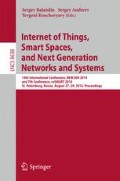Abstract
In this paper we analyze the functioning of multi-agent robotic systems with decentralized control in conditions of destructive information influences from robots-saboteurs. We considered a type of hidden attacks using interception of messages, formation and transmission of misinformation to a group of robots, and also realizing other actions which have no visible signs of invasion into a group of robots. We analyze existing models of information security of the multi-agent information system based on a measure of trust, calculated in the course of interaction of agents. We suggest a mechanism of information security in which robots-agents produce levels of trust to each other on the basis of the situation analysis developing on a certain step of an iterative algorithm with the use of onboard sensor devices. For improving the metric of likeness of objects relating to one category (“saboteur” or “legitimate agent”) we suggest an algorithm to calculate reputation of agents as a measure of the public opinion created in time about qualities of robots of the category “saboteur” in a group of legitimate robots-agents. It is shown that inter-cluster distance can serve as a metric of quality of trust models in multi-agent systems. We give an example showing the use of the developed mechanism for detection of saboteurs in different situations in using the basic algorithm of distribution of targets in a group of robots.
Access this chapter
Tax calculation will be finalised at checkout
Purchases are for personal use only
Preview
Unable to display preview. Download preview PDF.
References
Wooldridge, M.: An Introduction to MultiAgent Systems, 366 p. John Wiley & Sons Ltd., paperback (2002) ISBN 0-471-49691-X
Higgins, F., Tomlinson, A., Martin, K.M.: Threats to the Swarm: Security Considerations for Swarm Robotics. International Journal on Advances in Security 2(2&3), 288–297 (2009)
Zikratov, I.A., Kozlova, E.V., Zikratova, T.V.: Analysis of vulnerability of robotic complexes with swarm intellect. Scientific and Technical Journal of Information Technologies, Mechanics and Optics 5(87), 149–154 (2013)
Neeran, K.M., Tripathi, A.R.: Security in the Ajanta MobileAgent system. Technical Report. Department of Computer Science, University of Minnesota (May 1999)
Sander, T., Tschudin, C.F.: Protecting Mobile Agents against malicious hosts. In: Vigna, G. (ed.) Mobile Agents and Security. LNCS, vol. 1419, pp. 44–60. Springer, Heidelberg (1998)
Xudong, G., Yiling, Y., Yinyuan, Y.: POM-a mobile agent security model against malicious hosts. In: Proceedings of High Performance Computing in the Asia-Pacific Region, vol. 2, pp. 1165–1166 (2000)
Page, J., Zaslavsky, A., Indrawan, M.: A Buddy model of security for mobile agent communities operating in pervasive scenarios. In: Proceeding of the 2nd ACM Intl. Workshop on Australian Information Security & Data Mining, vol. 54 (2004)
Page, Zaslavsky, A., Indrawan, M.: Ountering security vulnerabilities using a shared security buddy model schema in mobile agent communities. In: Proc. of the First International Workshop on Safety and Security in Multi-Agent Systems (SASEMAS 2004), pp. 85–101 (2004)
Schillo, M., Funk, P., Rovatsos, M.: Using trust for detecting deceitful agents in artificial societies. Applied Artificial Intelligence 14, 825–848 (2000)
Golbeck, J., Parsia, B., Hendler, J.: Trust Networks on the Semantic Web. In: Klusch, M., Omicini, A., Ossowski, S., Laamanen, H. (eds.) CIA 2003. LNCS (LNAI), vol. 2782, pp. 238–249. Springer, Heidelberg (2003)
Garcia-Morchon, O., Kuptsov, D., Gurtov, A., Wehrle, K.: Cooperative security in distributed networks. Computer Communications (COMCOM) 36(12), 1284–1297 (2013)
Ramchurn, S.D., Huynh, D., Jennings, N.R.: Trust in multi-agent systems. The Knowledge Engineering Review 19(1), 1–25 (2004)
Kalyaev, I.A., Gayduk, A.R., Kapustyan, S.G.: Models and algorithms of collective control in groups of robots, 280 p. Physmathlit, Moscow (2009)
Zikratov, I.A., Zikratova, T.V., Lebedev, I.S.: Confidential model of information security of multi-agent robotic systems with decentralized control. Scientific and Technical Journal of Information Technologies, Mechanics and Optics 2(90), 47–52 (2014)
Carter, J.: Reputation Formalization for an Information-Sharing Multi-Agent System. Computational Intelligence 18(2), 515–534
Beshta, A., Kipto, M.: Creation of model of trust to objects of an automated information system for preventing of destructive impact on system. News of Tomsk Polytechnic University 322(5), 104–108 (2013)
Author information
Authors and Affiliations
Editor information
Editors and Affiliations
Rights and permissions
Copyright information
© 2014 Springer International Publishing Switzerland
About this paper
Cite this paper
Zikratov, I.A., Lebedev, I.S., Gurtov, A.V. (2014). Trust and Reputation Mechanisms for Multi-agent Robotic Systems. In: Balandin, S., Andreev, S., Koucheryavy, Y. (eds) Internet of Things, Smart Spaces, and Next Generation Networks and Systems. NEW2AN 2014. Lecture Notes in Computer Science, vol 8638. Springer, Cham. https://doi.org/10.1007/978-3-319-10353-2_10
Download citation
DOI: https://doi.org/10.1007/978-3-319-10353-2_10
Publisher Name: Springer, Cham
Print ISBN: 978-3-319-10352-5
Online ISBN: 978-3-319-10353-2
eBook Packages: Computer ScienceComputer Science (R0)

